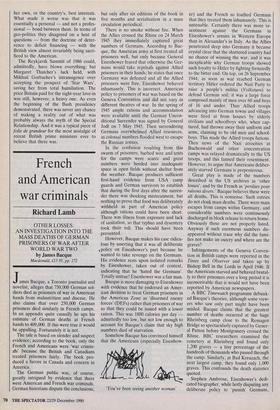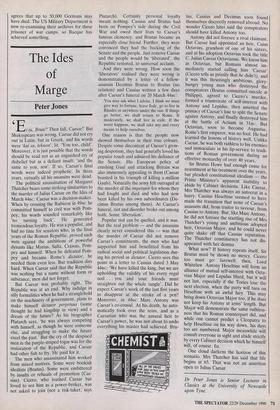French and American war criminals
Richard Lamb
OTHER LOSSES: AN INVESTIGATION INTO THE MASS DEATHS OF GERMAN PRISONERS OF WAR AFTER WORLD WAR TWO by James Bacque
Macdonald, f13.95, pp. 272
James Bacque, a Toronto journalist and novelist, alleges that 750,000 German sol- diers died as prisoners of war in American hands from malnutrition and disease. He also claims that over 250,000 German prisoners died similarly in French camps. In an appendix quite casually he ups his estimate of German deaths at French hands to 409,000. If this were true it would be appalling. Fortunately it is not.
The tale is based on slender and suspect evidence; according to the book, only the French and Americans were 'war crimin- ats' because the British and Canadians treated prisoners fairly. The book pro- duced a furore in Canada and concern in America.
The German public was, of course, greatly intrigued by evidence that there were American and French war criminals. German historians dispute the conclusions, but only after six editions of the book in five months and serialisation in a mass circulation periodical.
There is no smoke without fire. When the Allies crossed the Rhine on 24 March 1945 they immediately captured great numbers of Germans. According to Bac- que, the American army at first treated all prisoners well, but only because General Eisenhower feared that otherwise the Ger- mans would take reprisals against Allied prisoners in their hands; he states that once Germany was defeated and all the Allied prisoners were free, Eisenhower behaved inhumanely. This is incorrect. American policy to prisoners of war was based on the Geneva Convention and did not vary in different theatres of war. In the spring of 1945 ample rations and accommodation were available until the German Uncon- ditional Surrender was signed by General Jodl on 7 May 1945. Then surrendering Germans overwhelmed Allied resources, as colossal numbers flooded west to escape the Russian armies.
In the confusion resulting from this swarm of prisoners, barbed wire and tents for the camps were scarce and great numbers were herded into inadequate space in open fields without shelter from the weather. Bacque produces sufficient first-hand evidence from USA camp guards and German survivors to establish that during the first days after the surren- der there was shocking mistreatment, but nothing to prove that food was deliberately withheld as part of American policy although rations could have been short. There was illness from exposure and lack of sanitation, so that typhus and dysentery took their toll. This should have been prevented.
However, Bacque makes his case ridicu- lous by asserting that it was all deliberate policy on Eisenhower's part because he wanted to take revenge on the Germans. His evidence rests upon isolated remarks by Eisenhower, taken out of context, indicating that he 'hated the Germans'. Totally untrue! Eisenhower was a fair man.
Bacque is more damaging to Eisenhower with evidence that he endorsed an Amer- ican decision to treat German prisoners in the American Zone as 'disarmed enemy forces' (DEFs) rather than prisoners of war so that they could be issued with a lower ration. This was 1800 calories per day — admittedly too low, but not low enough to account for Bacque's claim that sky high numbers died of starvation.
Somehow Bacque has convinced himself that the Americans (especially Eisenhow- `You've been seeing another woman' er) and the French so loathed Germans that they treated them inhumanely. This is untenable. Certainly there was more re- sentment against the Germans in Eisenhower's armies in Western Europe than in Alexander's in Italy. As the Allies penetrated deep into Germany it became crystal clear that the shattered country had no chance of winning the war, and it was inexplicable why German troops showed such loyalty to Hitler by fighting frenziedly to the bitter end. On top, on 26 September 1944, as soon as war reached German territory Hitler ordered the Nazi Party to raise a people's militia (Volksturn) to defend German soil; it was a _large force composed mainly of men over 60 and boys of 16 and under. Thus Allied troops advancing into German towns and villages were fired at from houses by elderly civilians and schoolboys who, when cap- tured, had thrown away their uniform and arms, claiming to be old men and school- boys. This made the Allied troops furious. Then news of the Nazi atrocities at Buchenwald and other concentration camps was relayed dramatically to the US troops, and this fanned their resentment. However, to argue that Americans deliber- ately starved Germans is preposterous.
Great play is made of the numbers described in the US archives as 'other losses', and by the French as 'perdues pour raisons divers.' Bacque believes these were all deaths. This is nonsense, Such entries do not cloak mass deaths. There were mass escapes from camps within Germany, and considerable numbers were continuously discharged in block release to return home. Obviously these are not properly listed. Anyway if such enormous numbers dis- appeared without trace why did the fami- lies not make an outcry and where are the graves?
Infringements of the Geneva Conven- tion in British camps were reported in the Times and Observer and taken up by Bishop Bell in the Lords in April 1946. If the Americans starved and behaved brutal- ly to their prisoners over a long period it is inconceivable that it would not have been reported by American newspapers.
A BBC Timewatch programme debunk- ed Bacque's theories, although some view- ers who saw only part might have been misled. Bacque claims that the greatest number of deaths occurred at the huge Rheinberg camp close to the Remagen Bridge so spectacularly captured by Gener- al Patton before Montgomery crossed the Rhine. BBC researchers examined the cemetery at Rheinberg and found only 1,200 graves — a tiny percentage of the hundreds of thousands who passed through the camp. Similarly, at Bad Kreuzach, the next largest camp, they found only 1,000 graves. This confounds the death statistics quoted.
Stephen Ambrose, Eisenhower's dedi- cated biographer, while hotly disputing any deliberate policy to 'punish' Germans, agrees that up to 50,000 Germans may have died. The US Military Department is now re-examining their archives for these prisoner of war camps, so Bacque has achieved something.



































































































 Previous page
Previous page